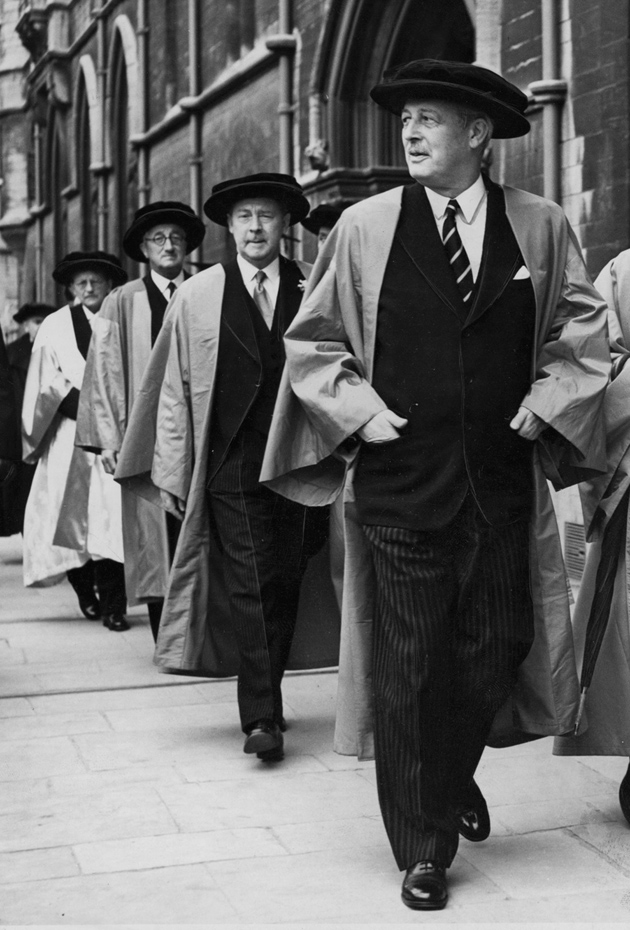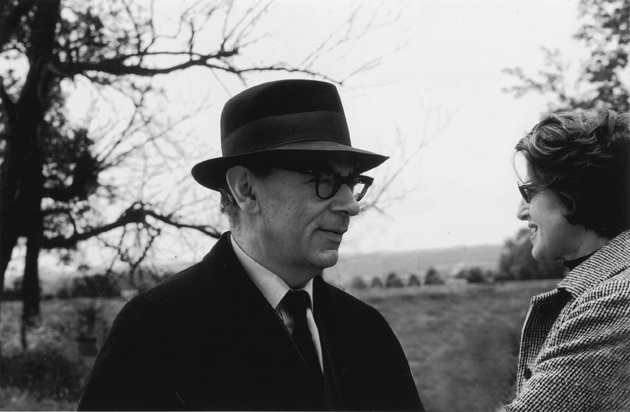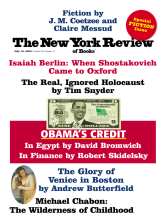The following letter from Isaiah Berlin to his friend Rowland Burdon-Muller about Dmitry Shostakovich’s visit to Oxford appears in Berlin’s Enlightening: Letters 1946–1960, to be published in the US in late July. The book marks the hundredth anniversary of his birth in 1909.
Berlin and his wife Aline were hosts to Shostakovich when he came to Oxford to receive an honorary degree of Doctor of Music on June 26, 1958. Francis Poulenc, similarly honored, stayed with the historian Hugh Trevor-Roper and his wife, whose house was the venue for a joint musical gathering.
—Henry Hardy and Jennifer Holmes
June 28, 1958
Dear Rowland,
…Poulenc and Shostakovich have come and gone. Goodness, but it was a business. First a great fuss about the British Council which had arranged elaborately for a musical party for S. on Monday night (we were to entertain him on Tuesday and he was to get his honorary degree with Macmillan and Gaitskell on Wednesday), but the Soviet Embassy appears to be engaged in some kind of warfare with the British Council and more or less forbade him to have anything to do with them. The result was that the party was held without him, much bad blood, general indignation, telegrams, anger, tears. He finally materialised on Tuesday, and it was a wonderful business.
First there arrived in our drawing room a very stiff and upright, rather handsome young Soviet official, who said: “I wish to introduce myself. My name is Loginov.1 The composer D.D. Shostakovich is in car outside. We were told you were expecting him at 4:00. It is now 3:00. Do you wish him to remain in car, or what?” We explained that we were expecting him at 3:00, and it would be perfectly permissible for him to enter straight away. Whereupon the car was ceremonially driven in, another Soviet official leapt out, and finally the composer himself appeared, small, shy, like a chemist from Canada (Western States), terribly nervous, with a twitch playing in his face almost perpetually—I have never seen anyone so frightened and crushed in all my life—he re-introduced the two Soviet officials as “my friends, my great friends,” but after he had been with us for a bit, and the Soviet officials were got out of the way, he never referred to them as that again, but only as “the diplomats.” Every time he mentioned them a curious expression of angst appeared on his face, rather like the expression which sometimes enters Aline’s face—indeed on the last morning of all when he was waiting for the two officials to appear and was in a state of utter panic and despair, I said in English (which he does not understand) to Aline, who was also looking rather distraught, that the expression of their faces was identical. Anyway the problem was how to get Shostakovich to stay to dinner and go on to the musical party given in the Trevor-Ropers’ house for him and Poulenc, and how to get rid of the two Soviet officials, who would cast a terrible frost on the occasion. In the end, I announced firmly to them that the University had a strict set of rules which it obeyed: under these a University official would appear in half an hour, and take them off to dinner in New College, after which they would be allowed to see a play (by David Pryce-Jones), while for Shostakovich an entirely different arrangement had been made. This they took calmly—after glancing at one another to see if it was all right—and bowed their heads submissively. The University official duly called, some unfortunate Fellow at New College was suborned to look after the two “diplomats,” and Shostakovich was left with us.
His manner brightened. But throughout the visit he looked like a man who had passed most of his life in some dark forbidding place under the supervision of jailers of some sort, and whenever the slightest reference was made to contemporary events or contemporary personalities, the old painful spasm would pass over his face, and his face would assume a haunted, even persecuted expression and he would fall into a kind of terrified silence. It was depressing and very harrowing, and made one like him and pity him a great deal. In due course the other guests appeared, Poulenc, Cecile,2 the Cecils, Jimmy Smith,3 the Trevor-Ropers etc., Poulenc was charming to S., and he visibly thawed under the benign influence. We dined, and went on to the Trevor-Ropers’ drawing room. There S. immediately made for the nearest corner and sat there, contracted like a hedgehog, occasionally smiling wanly if I made a particularly bold boutade. His cello sonata was played by a young and very handsome cellist from Ceylon,4 he listened to it calmly, said to me that the cellist was good, and the pianist very bad (which was perfectly true), and complained to the cellist that he had played two passages incorrectly.
Advertisement
The cellist flushed, produced the score, and S. saw that the score bore out the cellist. He could not think how this could be, suddenly realised that it had been edited [by] Piatigorsky, who had of course altered the score arbitrarily to please himself; this was the moment at which he came nearest to real rage, took out a pencil and violently crossed out Piatigorsky’s forgeries, and substituted his own original version. After that his brow cleared, and he returned to his little corner. Songs by Poulenc were then sung by Miss Margaret Ritchie,5 absurdly, in the ludicrous Victorian English fashion, Shostakovich writhed a little, but Poulenc, very polite, very mondain, congratulated her and made grimaces to others behind her back. After this a movement of Poulenc’s cello sonata was played, to placate him, and then there was a silence, and I said to S. that everyone would be delighted if he too played a little. Without a word he went to the piano and played a prelude and fugue—one of the twenty-four he has composed like Bach—with such magnificence, such depth and passion, the work itself was so marvellous, so serious and so original and unforgettable, that everything by Poulenc flew through the window and could not be recaptured. Poulenc did play something from Les Biches,6 and something else, but his music could not be listened to any more, the decadence of the Western world had alas become all too apparent. While playing, S.’s face really had become transformed, the shyness and the terror had gone, and a look of tremendous intensity and indeed inspiration appeared; I imagine that is how nineteenth-century composers may have looked like when they played. But I do not think it has been seen much in the Western world in the twentieth.
After that he ceased playing and various people wished to be presented. He showed the first violin of the Philharmonia Orchestra how to play the second and third movements of his concerto; he told Desmond Shawe-Taylor7 about his future plans; he gave autographs, he ate and drank. Poulenc, although looked after nicely, felt somewhat relegated, rather like Cocteau when Picasso is about. Everyone felt that this was a remarkable occasion, unique and moving, and although he spoke no English, everyone except the thickest-skinned and most philistine (like for example Mr Hodson, the editor of the Sunday Times, superfluously invited by the Ropers)8 felt moved, and said so in various ways afterwards. It really was an occasion and an experience.
After this, at home, he did talk a little, complained about no piano, discoursed on his musical taste, and went to bed almost happy I think. Meanwhile his two guardians went to an undergraduate party at New College, then to the Exeter Ball, had a tremendous time, exchanged insults and pleasantries with undergraduates and dons, and obviously enjoyed themselves. Very nice they turned out to be—they may have had their hands dripping with Hungarian blood, but personally they were innocent, rather wooden peasants, who obviously at an order from above would have had no compunction in shooting one dead, but at the same time had a certain charm.
On the next day the nervous tic began in S. again, he went through the horrors of the degree ceremony, was terribly embarrassed at meeting various people who spoke Russian at the All Souls luncheon, was always taking cover with me, who after all was an accredited representative of the University registered by the Soviet Embassy as such. People asked him intolerable questions such as “What has happened to your second, third and fourth symphonies?”—admirable works condemned by the regime. He would answer lamely, “They were not a very great success,” which was literally true, but he suffered as he spoke. An absurd incident occurred when Lord Beveridge,9 aged 84, tried to present him with a bunch of flowers—too large for a buttonhole, too small for a proper bouquet, which he had been charged to give him by some dim Welsh composer, and chose the middle of lunch to do so. Poor S. got up, mumbled, Beveridge, who was out of his mind, also mumbled, and they were taken apart with difficulty. Various White Russians tried to engage him in conversation, naturally enough, and he managed to disengage himself with enormous effort and agony. Finally we took him home, dressed him in a white tie and sent him to dine at Christ Church with the other recipients of honorary degrees, such as the Prime Minister, Gaitskell etc. He came home more dead than alive, but got up early the next morning and presented us with scores of three works with suitable inscriptions, and even talked a little about his wife and children.
Advertisement
At 10:00 AM the guardians were to call for him, but they were late. He got into a state of appalling nervous panic, made me ring the Mitre Hotel three times, began to wring his hands, wondered what would happen if he arrived late at the Embassy, how he would explain it, wondered whether his guardians had somehow abandoned him, or some mistake had been made for which he would be blamed, and got into an appalling neurotic state. However, they appeared, explained they were late because they had been buying guides to Oxfordshire at Blackwells, and took him off. I was invited to lunch with him in the Soviet Embassy next day, but refused. S. had seen enough of me, and knew enough about me to realise that I understood his position too well, and that I thought that it would be better for him to meet all the British musicians etc., whom he would meet in London through interpreters, and without being self-conscious about an observer understanding his reactions a little too well. So out of a kind of delicacy—I think you will agree it was not inappropriate—I refused, and that was that.
The whole thing has left me with a curious sensation of what it is to live in an artificial nineteenth century—for that is what Shostakovich does—and what an extraordinary effect censorship and prison has on creative genius. It limits it, but deepens it.
I must stop and go down to lunch with Peter and his school friends assembled round the table, but S.’s face will always haunt me somewhat, it is terrible to see a man of genius victimised by a regime, crushed by it into accepting his fate as something normal, terrified almost of being plunged into some other life, with all powers of indignation, resistance, protest removed like a sting from a bee, thinking that unhappiness is happiness and torture is normal life….
Yours ever, with much love,
Isaiah
This Issue
July 16, 2009
Advice to the Prince
-
1
Y. Loginov, 3rd Secretary at the Soviet Embassy in London.
↩ -
2
Baroness Cécile de Rothschild (1913–1995), sister of Elie de Rothschild and a close friend of Aline’s.
↩ -
3
James Frederick Arthur (“Jimmy”) Smith (1906–1980), Chairman, Sadler’s Wells Trust, 1948–1961; Director, Royal Opera House, 1950–1961.
↩ -
4
(Frank) Rohan de Saram (b. 1939), then starting his distinguished international career.
↩ -
5
Margaret Ritchie, stage name of Mabel Willard Ritchie (1902–1969), soprano.
↩ -
6
”The Hinds,” Poulenc’s 1924 ballet, which he later revised as an orchestral suite.
↩ -
7
Desmond Christopher Shawe-Taylor (1907–1995), chief music critic, Sunday Times, 1958–1983.
↩ -
8
Hugh Trevor-Roper recounted to Bernard Berenson that Isaiah Berlin had taken offense at Harry Hodson’s publishing in the Sunday Times (as “Philosopher on TV,” in the “Atticus” column, June 8, 1958) an item describing Berlin’s “huge liquid voice” as “like a melting Russian river in spring,” had threatened to boycott the gathering (of which he was the joint host) if Hodson attended, and was finally placated only by complicated arrangements ensuring that they never met (Letters from Oxford: Hugh Trevor-Roper to Bernard Berenson, edited by Richard Davenport-Hines, London: Weidenfeld and Nicolson, 2006, pp. 253–254). The item in question, heralding Berlin’s first and only appearance on The Brains Trust (on that same day), also mentioned his “bulky figure” and his dislike of the countryside, and suggested that he had sought Khrushchev’s help in obtaining a visa for his 1956 visit to Moscow.
↩ -
9
William Henry Beveridge (1879–1963), 1st Baron Beveridge 1946, economist and social reformer; Director, London School of Economics, 1919–1937; Master, University College, Oxford, 1937–1945; Chairman of the committee that in 1942 recommended the introduction of the Welfare State.
↩





